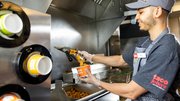Blog
5 POS pre-purchase questions for QSRs
Ask these five questions before and during your next POS purchase to ensure you're getting the right level of service and integrations for your QSR's needs.

March 4, 2019
By Del Williams/ ERC-sponsored technical writer
QSR operators who are either pondering a first-time POS purchase or in need of a new system, may save their businesses from lost opportunities and inadequate service by taking upfront time to ask five key pre-purchase questions.
By answering these queries before and during a POS purchase, operators stand the best chance of acquiring systems that grow with their brands, integrate with the back office and generate the kind of sales and labor data that gives the QSR the winning edge in a competitive fast food marketplace.
- What are my brand's "must have" POS capabilities?
Aside from rock-solid reliability, flexibility and scalability, QSR POS systems increasingly must be able to integrate equipment like POS touchscreen terminals, payment "swiping" mechanisms and back office operations software. Beyond these basic requirements, consider whether your brand demands a system that can work with equipment like surveillance systems, speed-of-service timers, drive-thru order confirmation boards, wireless headsets and mobile ordering technology.
Likewise, consider whether you need a system that can incorporate smartphone ordering, mobile wallets, tableside ordering and payment and loyalty program implementation, using cloud computing, mobile apps, social media and point plans across all chain locations.
"A good POS system is the lifeblood of a QSR because it speeds service, payment and provides managers with the data needed to improve virtually every aspect of store operation," said QSR POS provider, ERC President Chuck Rollins, whose company has supplied POS systems to more than 10,000 restaurants. "When integrated, the technology must work together flawlessly to enable managers to efficiently analyze and act on key data, like net sales, labor costs, overtime warnings, and employee performance."
- Does the POS vendor offer timely support?
By timely support, QSR operators should look for POS providers that have a record for trouble-free installation, as well as onsite restaurant staff training and extended management, rapid "help desk" resolution, as well as any franchise requirements unique to your brand's system.
"Technology inevitably has issues, and we did not want to call an 800 number or wait on tech support to get back to us when we need an immediate solution," said multi-unit Arby's franchisee, Beavers Inc through its CFO Brandon Spain.
Beavers Inc operates an ERC full POS package with Focus software and tablet PCs, allowing him to call the company's decision-makers in the event of any issues.
- How much POS flexibility does your brand require?
Look for POS providers who are flexible enough to modify your system as needs change. This is particularly true if yours is an emerging brand that demands a higher level of support to evolve from a localized operation to a multi-unit system.
"Because we are an emerging chain, everything is not yet set in stone," Surcheros founder and CEO Luke Christian, said of the nine-unit brand which is in expansion mode. "We needed a POS provider that is willing to adapt the system to us as we expand and our requirements change."
But Christian said Surcheros' initial iPad-based POS system wasn't flexible enough for the brand's needs.
"As we started to grow, we realized that our system didn't have the capabilities or support we need, whether being PCI-compliant, providing the reporting to manage our locations or integrating our in-store and online ordering," he said, adding that the brand ultimately settled on a system with Focus software that filled the bill.
For instance, previously the brand's third-party mobile app provider put online and in-store orders on different systems which made it tough to reconcile the two at day's end. But the new system uses a mobile ordering interface that integrates completely with software being used.
"Now we know exactly what sales are in real time whether in-store or online," he said.
- Is the training provided sufficient for my brand's needs
Poor or insufficient POS training can easily result in system misuse that ultimately slows or disrupts store operations, so seek a POS vendor that not only has a reputation for trouble-free installation, but also provides extensive onsite employee training and management that extends beyond just a few hours.
"We wanted our employees to get the hang of the POS system and be able to handle a high volume of customers very quickly," Willie Jewell's Old School Bar-B-Q CEO Josh Martino, said of the Florida-based chain. "Every time we open a new store, ERC sends a staff member to stay onsite with us for a few days. The trainer works with our cashiers and even stands behind them to help with anything that comes up."
- Steer clear of overbuilt POS options and their costs
While the previous four pointers will help ensure you get the POS you need into the future, also take steps to avoid overpaying for a system that provides more capabilities than necessary.
"We have been set up on 'Cadillac systems' before that have far more capabilities than we would ever need - and were paying for those, unfortunately," Martino said of his brand's experience.
"A lot of companies will sell you a base system and then charge extra for all the added programs and apps. It's funny, every add-on seems to be another $99 a month to the fee and that adds up. Our current POS system has everything we want. There have been no add-on costs and no surprises, which help(s) each store budget appropriately and maximize its profitability."
Del Williams is a technical writer based in Torrance, California.
 ChatGPT
ChatGPT Grok
Grok Perplexity
Perplexity Claude
Claude








